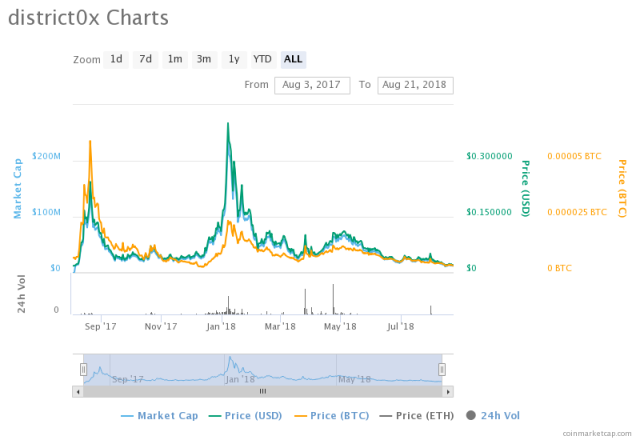In February 2017, a new idea emerged among decentralized networks. district0x launched to provide one of the world's first networks of decentralized markets and communities. Essentially, it means that anyone anywhere in the world can join and create a decentralized autonomous organization (DAO) without needing to know or understand code. The network incorporates three essential elements of decentralization that any DAO will need to operate seamlessly:
- Smart contracts
- Governance
- Decentralized file storage

Screenshot of district0x website
Currently, district0x has three districts operating on the platform with a fourth district being voted upon by token holders. The first district created was Ethlance, a freelance marketplace where freelancers are paid in ether. The other two districts are Name Bazaar, a peer-to-peer marketplace where Ethereum users can exchange .eth domain names, and Meme Factory, a place to trade digital assets.
district0x ICO and Tokens
district0x held its initial coin offering (ICO) from July 16, 2017 to July 30, 2017 and raised $9 million. The district0x token (DNT) is currently trading at $0.020933, down from its all-time high of 0.482887 on January 6, 2018. Its market cap on August 15, 2018 was $11,263,663, which is a far cry from its all-time high on January 7, 2018 of $242,557,312. Interestingly, DNT followed a fairly straight trajectory during last year's bull rally, and, like most ICOs, rose sharply immediately following the close (on August 21, 2017) to 0.261498 before dipping and riding the wave to an end-of-year close of 0.144436.

From CoinmarketCap
These numbers don't particularly inspire confidence in DNT's value, but another way of looking at it is the bear market could be the right time to buy into projects that show promise. I'd say district0x is one such project, but with only three successful district launches to date, it's difficult to judge its long-term staying power. Ethlance has done well, but it doesn't offer market participants DNT payment options, and district0x doesn't require it of approved districts. This is both a strength and a weakness.
DNT is a staking token, which means it is simply used to give users a voting stake in the various districts they may wish to participate in. Participants can increase their voting power by allocating more DNTs to a district. While deploying DNTs as a staking token assures it maintains a certain stability, it also limits its ability to increase in value. Supply and demand is based solely on the number of districts available for users to participate in and the popularity of those districts. Experience shows that most users do not participate in democratic processes unless they can see a clear benefit, and in many cases, that benefit is measured in financial rewards.
district0x's philosophy is tilted toward freedom of choice. While I understand that giving districts the freedom to choose may boost district0x's reputation over the long haul, DNT's value could see a boost if its districts did use the DNT token for currency. For that reason, it might behoove the network to incentivize the use of its DNT token for marketplaces and communities in order to encourage a broader application of the token. The other option is to bank on more districts opening that will use the DNT to stake user voting rights, but that could be a much slower process.
The number of tokens to be minted is set at 1 billion. Over half of the available tokens right now are owned by only five wallet addresses.
Smart Contracts, Governance, and File Storage
One of the advantages to building on the Ethereum blockchain is Ethereum's support for smart contracts. That was a good move, but the front-end libraries that make up the d0xINFRA framework don't seem to offer much customization in "under-the-hood" features. The bright side is, customization can take place in visual design of districts, which does give the appearance of customization. The upside to the framework is users can select specific backend features as defined by the d0xINFRA framework, which means that users don't have to be coders in order to build a district.
While the framework's basic infrastructure consists of the front-end libraries, district creators can make use of auxiliary modules to give their districts more features. Think of these as plugins that extend the functionality of a district. district0x also allows third-party developers to create their own modules.
District governance is handled by Aragon, an operating system launched in 2017 specifically for decentralized entities. The system handles voting rights distribution, role assignments, and accounting for districts. Users can change their bylaws to add customized features. When a user joins a district on the distric0x platform, they can deposit their DNTs into a district-specific token pool that allows them to vote according to their stake weight.
The file storage for district0x is handled by IPFS. The strength of IPFS lies in its ability to store large files without storing them in a centralized folder, either on the blockchain or the wider web. Large files often take a long time to upload and download, but with IPFS, the process is much quicker and easier as content can be distributed across various nodes and accessed when needed. This is becoming an essential tool as more data is created and accessed through the growth of the web and the Ethereum blockchain.
District Registry and Ethereum Tokenomics
One other aspect of district0x that bears mentioning is its district registry. The network gives users the ability to submit new district proposals. The process involves a deposit of DNTs along with the proposal. During a challenge period, any other network participant can submit an equal number of DNTs to initiate a voting round. If no such challenge is issued, the new district proposal is automatically added to the registry. During a voting round, network participants vote on proposals according to the number of DNTs they possess. Interestingly, if the challenge is successful, then the proposal is rejected and the proposer's DNTs are forfeited and distributed to voters proportionally based on their stake weight. On the flip side, if a challenge is unsuccessful, then the challenger's DNTs are forfeited and distributed likewise.
One of the primary weaknesses of the district0x platform is the decision to pay all expenses, including contributor wages, with ETH. Doing so banks on the probability that the price of ETH would continue to rise, but in a down market, such as now, the incentive for contributors to put as much into the development and promotion of the platform would not be as high. Here, again, is where the DNT token could come to rescue. In a down market, such contributors could opt to be paid in DNT and therefore be compensated by increased voting stake in the network. That kind of compensation is less likely to be affected by the crypto market as a whole.
It is unclear how easy it is to create DAOs on the district0x platform. If the cost and time savings are not significant, then there may not be many districts to created. Also, if you stake an unprofitable district, you will not be able to receive distributions from it.
At the moment, only the district0x Project Team can create districts, but this will change in the near future. After ironing out final details, the developers will launch a district creation platform. Once this platform is released, anyone on the internet can quickly create their own district within the district0x network.
district0x is designed to be free of intermediaries and censorship, giving internet citizens the ability to build whatever they need. While waiting for the district creation platform to launch, those interested can vote on which districts they would like to be deployed next. This is being done via community proposals, allowing users to suggest districts as well as vote on the existing suggestions.
district0x was founded by Matus Lestan, the developer of Ethlance, and Joe Urgo, former operations manager at Coinbase and a derivates trader. Project advisors include Luis Cuende, Aragon co-founder; Carl Bennett, Stratus co-founder; and a trio of venture capitalists including Manmeet Singh, co-founder of Blockseed Ventures.
In general, district0x looks like a project worth keeping an eye on, with a strong team of developers working to create a transparent, autonomous, inclusive, and decentralized system. Their plan to a create an information hub specific to the district0x network and more generally the cryptocurrency ecosystem shows a commitment to making a friendly space for newcomers and casual observers of the cryptosphere to learn the basics of the newest trends in the space. The project only needs a few districts to be successful in order to bring more people to its platform, and to keep growing.

This article was written for trivial.co, an analytics platform for tokens on the Ethereum network. If you have good knowledge about a token, don't keep it to yourself. Write for Trivial!

Available on Amazon


Review Me, Please
The backside 5:
- Steem Monsters Fantasy Story Contest - Giant Roc: Born of Wind, Hard as Stone
- Farmpunk Flash Fiction Contest Winner
- Poetry Sunday: 'I Like War' and 'Piano'
- Literary Mashup: A Furry Little Love Triangle
- Comedy Open Mic #26: Top 10 Blockchain Projects of the Last 100 Years


Animation By @zord189

created and used by veterans
with permission from @guiltyparties


Posted from my blog with SteemPress : http://tayloredcontent.com/district0x-creating-a-network-of-decentralized-markets/
